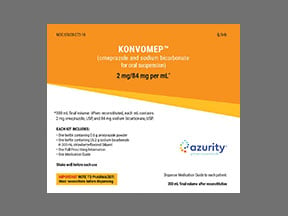
Konvomep Coupons & Savings Card – Discount Prices from $272.36
My prescription
Edit
150ML of 2-84MG/ML, Konvomep (1 Bottle)
Select pharmacy

CVS
$350.09
COUPON PRICE
Walmart
$272.36
COUPON PRICE
Albertsons
$283.33
COUPON PRICE
Walgreens
$293.03
COUPON PRICEKonvomep savings card
Show this card to your pharmacist
Walmart
$272.36
BIN
ID
PCN
GRP
019876
LH75B330C5
CHIPPO
LHX
Powered by
Related proton pump inhibitors prescriptions
More prescriptions for heartburn
Related proton pump inhibitors prescriptions
More prescriptions for heartburn
Price history for Konvomep
1 Bottle, 150ML of 2-84MG/ML
Average retail price for Konvomep
Average SaveHealth price for Konvomep
Our price history data is based on aggregated prescription data collected from participating pharmacies in America. Our prescription data updates daily to reflect the latest price changes. If you notice a missing data point, it means there wasn't sufficient data available to generate a monetary value for that date.
*Retail prices are based on pharmacy claims data, and may not be accurate when we don't have enough claims.
Konvomep dosage forms
Dosage Quantity Price from Per unit 150ML of 2-84MG/ML 1 Bottle $272.36 $272.36 150ML of 2-84MG/ML 2 Bottles $551.66 $275.83 150ML of 2-84MG/ML 3 Bottles $819.99 $273.33
| Dosage | Quantity | Price from | Per unit |
|---|---|---|---|
| 150ML of 2-84MG/ML | 1 Bottle | $272.36 | $272.36 |
| 150ML of 2-84MG/ML | 2 Bottles | $551.66 | $275.83 |
| 150ML of 2-84MG/ML | 3 Bottles | $819.99 | $273.33 |
Is omeprazole the same as konvomep?
Omeprazole and Konvomep are not the same, but they are related. Omeprazole is a proton pump inhibitor used to reduce stomach acid. Konvomep is a brand name that contains omeprazole as its active ingredient. Therefore, Konvomep includes omeprazole, but they are not identical as Konvomep may contain other components or be formulated differently.
What is konvomep used for?
Konvomep is used to treat conditions related to excess stomach acid, such as gastroesophageal reflux disease (GERD), erosive esophagitis, and Zollinger-Ellison syndrome. It combines omeprazole, a proton pump inhibitor, with sodium bicarbonate, which helps protect the omeprazole from stomach acid degradation.
Is konvomep approved for infants?
Konvomep is not approved for use in infants. It is important to consult a healthcare professional for appropriate treatment options for infants.
Does konvomep need to be refrigerated?
Konvomep does not need to be refrigerated. It should be stored at room temperature, away from moisture and heat.
Can konvomep cause constipation?
Yes, Konvomep can cause constipation as a side effect. It is important for individuals experiencing this to stay hydrated, maintain a balanced diet with adequate fiber, and consult their healthcare provider if the issue persists or worsens.
